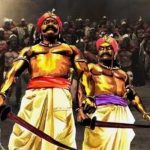Soldiers as martyrs: a misnomer
In India, it has become common practice nowadays to describe soldiers who are killed in action as martyrs. The dictionary meaning of a martyr is someone who is killed because of his or her religious or other beliefs. The word, which originates from the Greek word ‘martys’ meaning ‘witness’ is universally attributed to someone who suffers persecution and death for advocating or renouncing a religious or political belief or cause. A soldier who is killed in battle does not fit this description for the primary reason that it conveys a sense of passivity. Mahatma Gandhi was a martyr, so was Martin Luther King; but not the soldiers in battle who fight till their last gasp before being killed.
A soldier who goes into battle does not do so to offer himself to be persecuted or killed. He goes in there to kill the enemy. He is a professional trained and dedicated to defend his country against its external enemies. The possibility of being killed during the performance of his duty is an occupational hazard he willingly accepts. Also, in such an instance, he goes down fighting; not tantamount in any way to submitting himself to be killed without offering resistance. It is this paradigm that prompted the famous words of the World War II American General, George S Patton, that no one ever won a war by dying for his country, but he did it by killing others who wanted to die for their country.
KIA, for Killed in Action, is a term used by the armed forces, and the armed forces alone, the world over and it carries with it all the solemnity and dignity the sacrificial act of a soldier who falls in battle deserves. In fact, India and Pakistan are the only two countries in the world that have resorted to using the strange term of martyrdom for soldierly death (Pakistanis use the word ‘shahid’ for martyr). It is an affliction touted by the media (with TV channels in forefront) in recent times, probably under the misconception that they are honouring the fallen soldiers with a stronger terminology. Unfortunately, what it demonstrates is a lack of linguistic finesse on their part.
One of the most appealing epitaphs a visitor to the famous war cemetery at Kohima would find is on the tombstone of a 19-year old second lieutenant, wherein it is inscribed ‘Killed in Action’ followed by the young officer’s dates of birth and death, with the name of his father, a lieutenant colonel, underneath. The old soldier could find no better words to express his grief at the loss of his son mingled with the pride at his gallant end. The ultimate thought that propels a soldier forward in battle, risking his life, is that he would be remembered to have been killed in action, that he would be leaving a legacy of honour.
Calling KIA martyrdom amounts to undermining the bravery of the soldier while courting death in battle. English language does not really have another phrase that is synonymous with KIA and can convey the true sense of gravity and honour it carries. We do however have an Indian word, ‘Veergati’, which does fit the bill. Originating from Hindu mythology, the word translates to ‘brave death’ or ‘death of the brave’. Perhaps those who rate KIA as lacking in intensity to convey the death of a soldier in battle could adopt this Indian word, if they are so particular to have a more powerful expression. After all, with the armed forces themselves having adopted the term ‘Veer Naris’ for war widows, it might even be most appropriate to popularize this word.
It is strange that the armed forces top brass or the Ministry of Information and Broadcasting has not noticed this anomaly so far and has let the media have its way with such a clumsy usage that the whole country is lapping up. The least the government machinery could do is to forbid with immediate effect the use of the word ‘martyr’ for a soldier killed in action.





